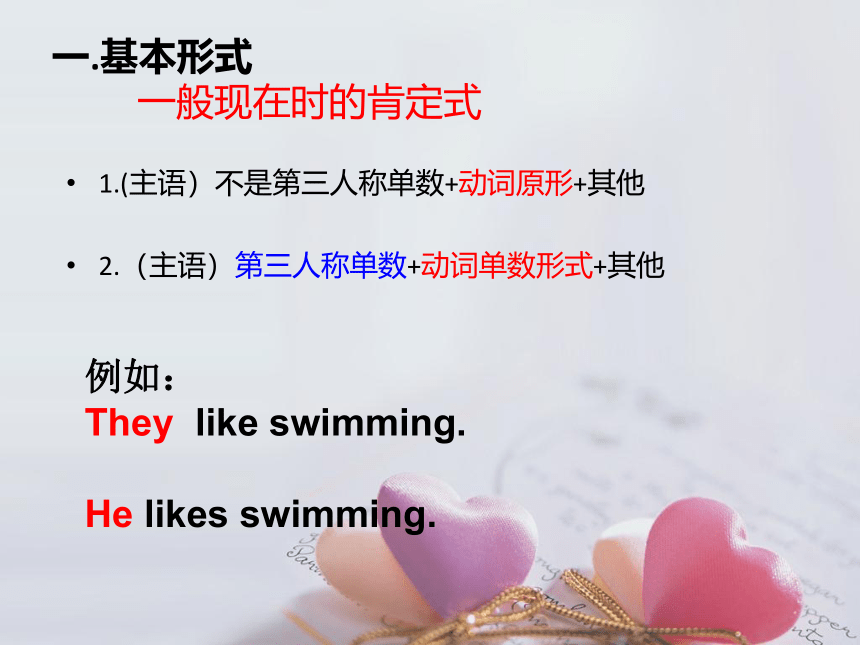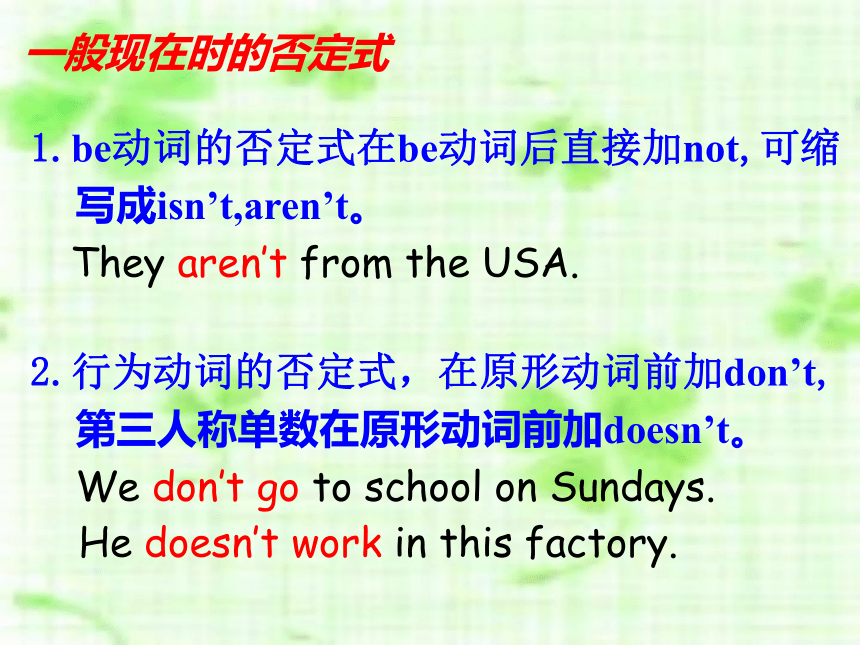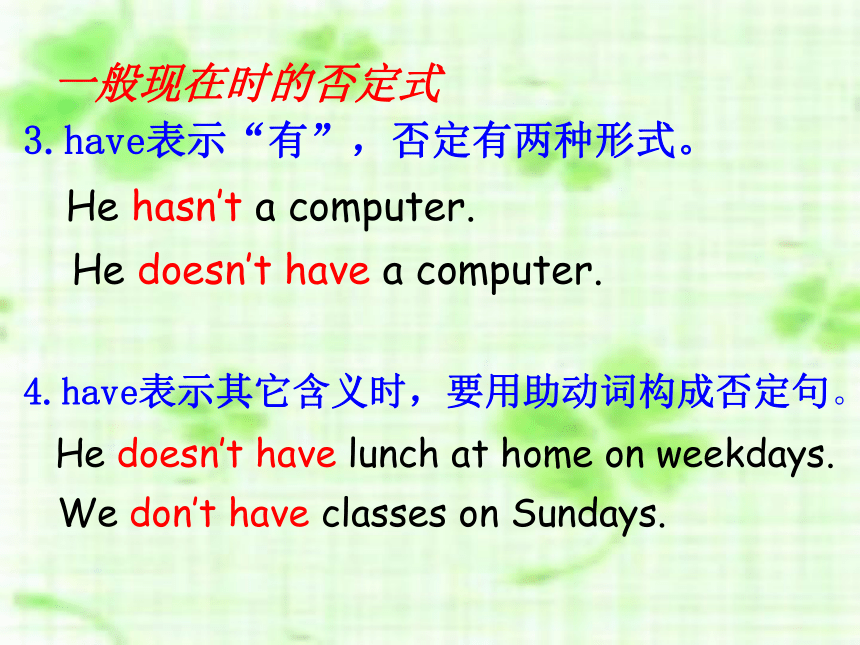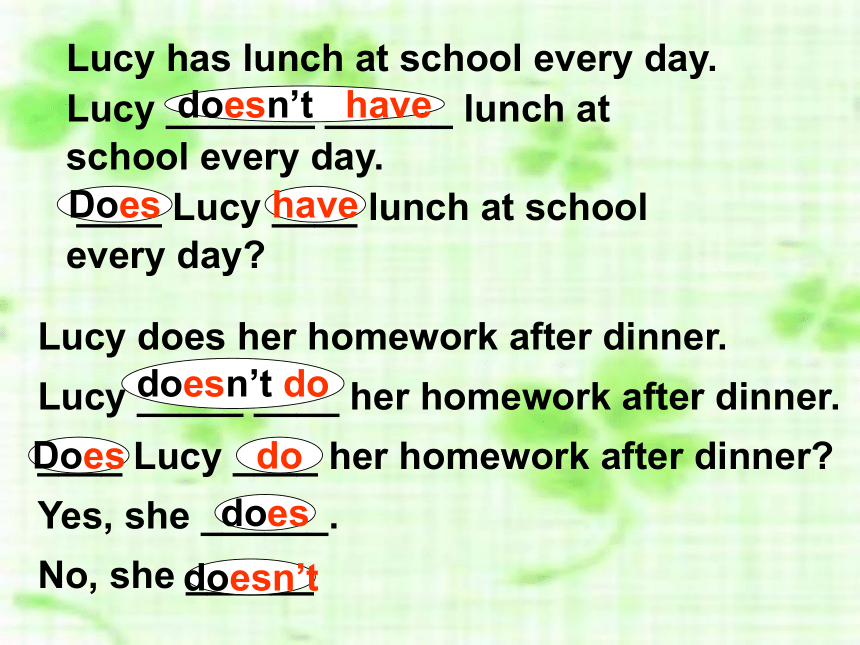中考英语专题复习之一般现在时态 课件(共38张PPT,无音频)
文档属性
| 名称 | 中考英语专题复习之一般现在时态 课件(共38张PPT,无音频) |  | |
| 格式 | zip | ||
| 文件大小 | 797.5KB | ||
| 资源类型 | 教案 | ||
| 版本资源 | 人教新目标(Go for it)版 | ||
| 科目 | 英语 | ||
| 更新时间 | 2021-03-29 21:37:30 | ||
图片预览












文档简介
(共38张PPT,无音频)
The
simple
present
tense
By
林秋谷
Warming—up
Tom,
do
you
usually
walk
to
school?
Does
Tom
usually
walk
to
school?
Tom
usually
walks
to
school.
一般现在时
一般现在时
一般现在时表示经常或习惯性的动作,也可表示现在的状态或主语具备的性格和能力等。
一.基本形式
一般现在时的肯定式
1.(主语)不是第三人称单数+动词原形+其他
2.(主语)第三人称单数+动词单数形式+其他
例如:
They
like
swimming.
He
likes
swimming.
哪些主语是第三人称单数?
1、人称代词he,
she,
it是第三人称单数。
?
He
likes
watching
TV.
他喜欢看电视。
??
She
has
lunch
at
twelve.
她十二点吃午餐。
It
looks
like
a
cat.
它看起来像只猫。
2、单个人名、地名或称呼作主语;是第三人称单数。
①Han
Mei
looks
like
her
mother.
韩梅看起来像她的母亲
?②Beijing
is
in
China.
北京在中国。
?③Uncle
Wang
often
makes
cakes.
王叔叔经常做蛋糕。
3、单数可数名词或"this
/
that
/
the+单数可数名词"作主语时,是第三人称单数。
①A
panda
is
a
shy
animal.
熊猫是害羞的动物。
??
②This
book
is
yellow.
这本书是黄色的。
??
③That
car
is
red.
那辆小汽车是红色的。
??
④The
cat
is
black.
这只猫是黑色的。
一般现在时的否定式
1.be动词的否定式在be动词后直接加not,可缩
写成isn’t,aren’t。
They
aren’t
from
the
USA.
2.行为动词的否定式,在原形动词前加don’t,
第三人称单数在原形动词前加doesn’t。
We
don’t
go
to
school
on
Sundays.
He
doesn’t
work
in
this
factory.
3.have表示“有”,否定有两种形式。
He
hasn’t
a
computer.
He
doesn’t
have
a
computer.
4.have表示其它含义时,要用助动词构成否定句。
He
doesn’t
have
lunch
at
home
on
weekdays.
We
don’t
have
classes
on
Sundays.
一般现在时的否定式
一般现在时的疑问式
结构:Be动词/助动词(Do/Does)+主语+其
它成分。如:
1.Are
you
a
student?
2.Do
you
go
to
school
by
bike?
3.Does
Mary
come
from
the
UK?
Lucy
does
her
homework
after
dinner.
Lucy
_____
____
her
homework
after
dinner.
____
Lucy
____
her
homework
after
dinner?
Yes,
she
______.
No,
she
______
doesn’t
do
Does
do
does
doesn’t
Lucy
has
lunch
at
school
every
day.
Lucy
_______
______
lunch
at
school
every
day.
____
Lucy
____
lunch
at
school
every
day?
doesn’t
have
Does
have
二.动词的变化
1、大多数动词在词尾直接加s,
如read
→
reads
look→
looks
like→
likes
2、以辅音字母加y结尾的动词,要先将y变为i,再加es
如:fly
→flies
carry
→carries
study
→studies
3、以“s,
x,
ch,
sh”结尾的,在词尾加“es”,发音为[iz]
如:
??
teach-teaches
[iz];
watch-watches
[iz]
;miss-misses;relax-relaxes
4、以“o”结尾的动词,加“es”,读[z]
如:
??
go-goes
[z]
do-does
[z]
5、特殊情况:have—has
用一般现在时完成下列句子。
My
father_______(listen)
to
the
radio
every
day.
Mike_______
(study)
in
a
middle
school.
She______(take)
Eddie
for
a
walk
after
supper.
He_______(wash)
clothes
with
his
hands.
Simon
______
(pass)
the
ball
to
Daniel.
Miss
Li_______
(teach)
Chinese.
Look
at
the
animal,
it
____(have)
four
legs.
listens
studies
takes
washes
passes
teaches
has
三、一般现在时的用法
1.表示经常性或习惯性的动作。
如:I
get
up
at
six
every
day.我每天六点起床。
真题回顾:
1).Now
my
father
_____
his
bike
to
work
every
day
instead
of
driving.
A)
ride
B)
rode
C)
rides
D)
will
ride
2).
He
the
radio
every
morning.
A.listens
to
B.
listens
C
hears
D.
hears
of
A
C
3).John
likes
playing
soccer
very
much
and
he
about
one
hour
playing
it
every
day.
A.spent
B.will
spend
C.has
spent
D.spends
D
4).
A
large
number
of
engineers
__________
to
Africa
by
our
government
to
help
the
people
there
every
year.
(09.山西)
A.
have
sent
B.
will
send
C.
are
sent
C
2.表示主语的特征、能力、性格或状态。
I
like
playing
football.
我喜欢踢足球。
The
sky
is
blue.天空是蓝色的。
真题回顾:
1).—What
does
your
sister
like
doing
in
her
spare
time?
—She
watching
TV.(09,武汉)
A.
likes
B.
liked
C.
has
liked
D.
had
liked
A
2).—Do
you
know
if
Cindy
will
drive
to
Italy
this
weekend?
(10苏州)
—Cindy?
Never!
She
driving.
A.has
hated
B.hated
C.will
hate
D.hates
3).
—Can
I
help
you
?
—I
bought
this
watch
here
yesterday,
but
it
__________
work.
(09.江西)
A.
won’t
B.
didn’t
C.
doesn’t
D.
wouldn’t
D
C
puters
________widely
in
our
daily
life.
A
.
use
B.
used
C.
were
used
D.
are
used
D
3.表示客观真理和事实。
The
earth
moves
around
the
sun.
地球绕着太阳转。
注意;即使用于过去的语境中依然用一般现在时。如:
Our
geography
teacher
told
us
that
the
earth
goes
around
the
sun.
我们的地理老师曾告诉我们地球围绕太阳转。
真题回顾:
1)-What
did
your
dad
tell
you,
my
baby?
(10黑龙江鸡西)
-He
said
the
sun
______
in
the
east.
A.
went
up
B.
will
go
up
C.
goes
up
C
2)He
said
that
light
______much
faster
than
sound.
(11枣庄)
A.
has
travelled
B.
went
C.
travels
D.
travelled
3)The
teacher
told
us
that
the
earth
______
around
the
sun.
(11眉山)
A
went
B
goes
C
will
go
D
would
go
C
B
4.用于格言或警句中。
1)Bad
news
has
wings.
坏事传千里。
2)Pride
goes
before
a
fall.
骄者必败。
5.主将从现,即主句将来时态,从句用一般现在时代替将来时。
例句:If
you
don't
go
soon,you
will
be
late.
如果你不快点去,你会迟到的。
I
will
go
to
the
park
if
it
is
fine.
如果天气好的话,我将会去公园。
时间状语的引导词:
when
“当…时”
as
soon
as
“一……就……”
until
“直到…为止”
not
…
until…
“直到…才”
before
“在…之前”
条件状语引导词:
unless
“除非”
if
“如果”
真题回顾:
1.
Betty
will
ring
me
up
when
she
________
in
Beijing.
A.
arrive
B.
arrives
C.
arrived
D.
will
2.If
Tom
_____
the
game,
we'll
give
him
a
surprise".
A.
win
B.
wins
C.
won
D.
missing
B
B
3.
“I’ll
pay
him
as
soon
as
he
the
TV
set
to
my
home.”
said
the
man.
(10东营)
A.sends
B.
sent
C.
is
sending
D.
will
send
4.
Tom
will
call
me
as
soon
as
he
______
home.
(2010北京)
A.
gets
B.
has
got
C.
got
D.
will
get
5.
I'll
go
out
for
a
walk
after
supper
if
it
rain.
A.
didn't
B
won't
C.
isn't
D.
doesn't
A
A
D
6.
表示按时间表、计划或规定发生的动作。如:
The
train
for
Shenzhen
leaves
at
8:00
in
the
morning.
开往深圳的列车上午8点开车。
7.
在以here,
there开头的完全倒装句中,go,
come等动词用一般现在时表示正在发生的动作。
Here
he
comes.
他来了。
There
goes
the
bell.
铃响了。
四、时间状语
常见的时间状语:
always,
usually,regularly,
every
,once
a
month,
often,
sometimes
等。
例句:
1.I
leave
home
for
school
at
7:
00
every
morning.
2.She
sometimes
goes
shopping
on
Sundays.
练一练
1.
Peter
and
Mary
often_______(play)
badminton
together.
2.My
mother______(have)
a
lot
of
cousins.
3.Many
people
often
_______
(listen)
to
the
radio
in
the
moring.
4.She_____(have)four
brothers.
She______(like)
them
very
much.
5.
He
often
________(have)
dinner
at
home.
6.Sandy
usually
_______(play)
the
piano
on
Sundays.
play
has
listen
has
likes
has
plays
一般现在时态专练
一、
用括号中所给词的适当形式填空;
1.I
often
_____
(go)
swimming
on
Sunday.
2.My
daughter
_________
(watch)
TV
every
day.
Sometimes
she
_______
(see)
a
film
on
Sunday.
3.Li
Wei
________
(have)
a
daughter.
4.Her
mother
___________
(teach)
English
at
a
middle
school.
5.Jack
often
___________
(listen)
to
the
radio.
6.He
________
(say)
that
Li
Lei
is
tired.
go
watches
sees
has
teaches
listens
says
二、将下列句子变成否定式和一般疑问式:
1.We
go
to
school
at
night.
2.My
brother
works
in
a
factory.
3.Her
name
is
Mei
Ling.
We
don’t
go
to
school
at
night.
Do
you
go
to
school
at
night?
My
brother
doesn’t
work
in
a
factory.
Does
your
brother
work
in
a
factory?
Her
name
isn’t
Mei
Ling.
Is
her
name
Mei
Ling?
4.She
has
lunch
at
home.
She
doesn’t
have
lunch
at
home.
Does
she
have
lunch
at
home?
5.
She
can
swim.
She
can't
swim.
Can
she
swim?
一、单句改错
1.It
seem
like
a
good
idea.
答案:seem改为seems
2.Jack
usually
smokes
but
he
doesn?t
smoke
when
his
father
came.
答案:came改为comes
3.If
it
won’t
rain
tomorrow,
we’ll
go
climbing.
答案:won't改为doesn't
4.When
we
cross
streets,
wait
until
the
traffic
light
turn
green.
答案:turn改为turns
5.Scientists
say
that
in
many
areas
in
these
forests,
the
quantity
of
oxygen
reached
50,000/cm3.
答案:reached改为reaches
6.Now,
the
teenager
is
using
his
talent
to
become
a
DJ—a
person
who
mix
different
music
during
live
shows.
答案:mix改为mixes
7.Nowadays,
cycling,
along
with
jogging
and
swimming,
was
regarded
as
one
of
the
best
all-round
forms
of
exercise.
答案:was改为is
Summary
1.基本形式
2.动词变化
3.用法
4.时间状语
The
simple
present
tense
By
林秋谷
Warming—up
Tom,
do
you
usually
walk
to
school?
Does
Tom
usually
walk
to
school?
Tom
usually
walks
to
school.
一般现在时
一般现在时
一般现在时表示经常或习惯性的动作,也可表示现在的状态或主语具备的性格和能力等。
一.基本形式
一般现在时的肯定式
1.(主语)不是第三人称单数+动词原形+其他
2.(主语)第三人称单数+动词单数形式+其他
例如:
They
like
swimming.
He
likes
swimming.
哪些主语是第三人称单数?
1、人称代词he,
she,
it是第三人称单数。
?
He
likes
watching
TV.
他喜欢看电视。
??
She
has
lunch
at
twelve.
她十二点吃午餐。
It
looks
like
a
cat.
它看起来像只猫。
2、单个人名、地名或称呼作主语;是第三人称单数。
①Han
Mei
looks
like
her
mother.
韩梅看起来像她的母亲
?②Beijing
is
in
China.
北京在中国。
?③Uncle
Wang
often
makes
cakes.
王叔叔经常做蛋糕。
3、单数可数名词或"this
/
that
/
the+单数可数名词"作主语时,是第三人称单数。
①A
panda
is
a
shy
animal.
熊猫是害羞的动物。
??
②This
book
is
yellow.
这本书是黄色的。
??
③That
car
is
red.
那辆小汽车是红色的。
??
④The
cat
is
black.
这只猫是黑色的。
一般现在时的否定式
1.be动词的否定式在be动词后直接加not,可缩
写成isn’t,aren’t。
They
aren’t
from
the
USA.
2.行为动词的否定式,在原形动词前加don’t,
第三人称单数在原形动词前加doesn’t。
We
don’t
go
to
school
on
Sundays.
He
doesn’t
work
in
this
factory.
3.have表示“有”,否定有两种形式。
He
hasn’t
a
computer.
He
doesn’t
have
a
computer.
4.have表示其它含义时,要用助动词构成否定句。
He
doesn’t
have
lunch
at
home
on
weekdays.
We
don’t
have
classes
on
Sundays.
一般现在时的否定式
一般现在时的疑问式
结构:Be动词/助动词(Do/Does)+主语+其
它成分。如:
1.Are
you
a
student?
2.Do
you
go
to
school
by
bike?
3.Does
Mary
come
from
the
UK?
Lucy
does
her
homework
after
dinner.
Lucy
_____
____
her
homework
after
dinner.
____
Lucy
____
her
homework
after
dinner?
Yes,
she
______.
No,
she
______
doesn’t
do
Does
do
does
doesn’t
Lucy
has
lunch
at
school
every
day.
Lucy
_______
______
lunch
at
school
every
day.
____
Lucy
____
lunch
at
school
every
day?
doesn’t
have
Does
have
二.动词的变化
1、大多数动词在词尾直接加s,
如read
→
reads
look→
looks
like→
likes
2、以辅音字母加y结尾的动词,要先将y变为i,再加es
如:fly
→flies
carry
→carries
study
→studies
3、以“s,
x,
ch,
sh”结尾的,在词尾加“es”,发音为[iz]
如:
??
teach-teaches
[iz];
watch-watches
[iz]
;miss-misses;relax-relaxes
4、以“o”结尾的动词,加“es”,读[z]
如:
??
go-goes
[z]
do-does
[z]
5、特殊情况:have—has
用一般现在时完成下列句子。
My
father_______(listen)
to
the
radio
every
day.
Mike_______
(study)
in
a
middle
school.
She______(take)
Eddie
for
a
walk
after
supper.
He_______(wash)
clothes
with
his
hands.
Simon
______
(pass)
the
ball
to
Daniel.
Miss
Li_______
(teach)
Chinese.
Look
at
the
animal,
it
____(have)
four
legs.
listens
studies
takes
washes
passes
teaches
has
三、一般现在时的用法
1.表示经常性或习惯性的动作。
如:I
get
up
at
six
every
day.我每天六点起床。
真题回顾:
1).Now
my
father
_____
his
bike
to
work
every
day
instead
of
driving.
A)
ride
B)
rode
C)
rides
D)
will
ride
2).
He
the
radio
every
morning.
A.listens
to
B.
listens
C
hears
D.
hears
of
A
C
3).John
likes
playing
soccer
very
much
and
he
about
one
hour
playing
it
every
day.
A.spent
B.will
spend
C.has
spent
D.spends
D
4).
A
large
number
of
engineers
__________
to
Africa
by
our
government
to
help
the
people
there
every
year.
(09.山西)
A.
have
sent
B.
will
send
C.
are
sent
C
2.表示主语的特征、能力、性格或状态。
I
like
playing
football.
我喜欢踢足球。
The
sky
is
blue.天空是蓝色的。
真题回顾:
1).—What
does
your
sister
like
doing
in
her
spare
time?
—She
watching
TV.(09,武汉)
A.
likes
B.
liked
C.
has
liked
D.
had
liked
A
2).—Do
you
know
if
Cindy
will
drive
to
Italy
this
weekend?
(10苏州)
—Cindy?
Never!
She
driving.
A.has
hated
B.hated
C.will
hate
D.hates
3).
—Can
I
help
you
?
—I
bought
this
watch
here
yesterday,
but
it
__________
work.
(09.江西)
A.
won’t
B.
didn’t
C.
doesn’t
D.
wouldn’t
D
C
puters
________widely
in
our
daily
life.
A
.
use
B.
used
C.
were
used
D.
are
used
D
3.表示客观真理和事实。
The
earth
moves
around
the
sun.
地球绕着太阳转。
注意;即使用于过去的语境中依然用一般现在时。如:
Our
geography
teacher
told
us
that
the
earth
goes
around
the
sun.
我们的地理老师曾告诉我们地球围绕太阳转。
真题回顾:
1)-What
did
your
dad
tell
you,
my
baby?
(10黑龙江鸡西)
-He
said
the
sun
______
in
the
east.
A.
went
up
B.
will
go
up
C.
goes
up
C
2)He
said
that
light
______much
faster
than
sound.
(11枣庄)
A.
has
travelled
B.
went
C.
travels
D.
travelled
3)The
teacher
told
us
that
the
earth
______
around
the
sun.
(11眉山)
A
went
B
goes
C
will
go
D
would
go
C
B
4.用于格言或警句中。
1)Bad
news
has
wings.
坏事传千里。
2)Pride
goes
before
a
fall.
骄者必败。
5.主将从现,即主句将来时态,从句用一般现在时代替将来时。
例句:If
you
don't
go
soon,you
will
be
late.
如果你不快点去,你会迟到的。
I
will
go
to
the
park
if
it
is
fine.
如果天气好的话,我将会去公园。
时间状语的引导词:
when
“当…时”
as
soon
as
“一……就……”
until
“直到…为止”
not
…
until…
“直到…才”
before
“在…之前”
条件状语引导词:
unless
“除非”
if
“如果”
真题回顾:
1.
Betty
will
ring
me
up
when
she
________
in
Beijing.
A.
arrive
B.
arrives
C.
arrived
D.
will
2.If
Tom
_____
the
game,
we'll
give
him
a
surprise".
A.
win
B.
wins
C.
won
D.
missing
B
B
3.
“I’ll
pay
him
as
soon
as
he
the
TV
set
to
my
home.”
said
the
man.
(10东营)
A.sends
B.
sent
C.
is
sending
D.
will
send
4.
Tom
will
call
me
as
soon
as
he
______
home.
(2010北京)
A.
gets
B.
has
got
C.
got
D.
will
get
5.
I'll
go
out
for
a
walk
after
supper
if
it
rain.
A.
didn't
B
won't
C.
isn't
D.
doesn't
A
A
D
6.
表示按时间表、计划或规定发生的动作。如:
The
train
for
Shenzhen
leaves
at
8:00
in
the
morning.
开往深圳的列车上午8点开车。
7.
在以here,
there开头的完全倒装句中,go,
come等动词用一般现在时表示正在发生的动作。
Here
he
comes.
他来了。
There
goes
the
bell.
铃响了。
四、时间状语
常见的时间状语:
always,
usually,regularly,
every
,once
a
month,
often,
sometimes
等。
例句:
1.I
leave
home
for
school
at
7:
00
every
morning.
2.She
sometimes
goes
shopping
on
Sundays.
练一练
1.
Peter
and
Mary
often_______(play)
badminton
together.
2.My
mother______(have)
a
lot
of
cousins.
3.Many
people
often
_______
(listen)
to
the
radio
in
the
moring.
4.She_____(have)four
brothers.
She______(like)
them
very
much.
5.
He
often
________(have)
dinner
at
home.
6.Sandy
usually
_______(play)
the
piano
on
Sundays.
play
has
listen
has
likes
has
plays
一般现在时态专练
一、
用括号中所给词的适当形式填空;
1.I
often
_____
(go)
swimming
on
Sunday.
2.My
daughter
_________
(watch)
TV
every
day.
Sometimes
she
_______
(see)
a
film
on
Sunday.
3.Li
Wei
________
(have)
a
daughter.
4.Her
mother
___________
(teach)
English
at
a
middle
school.
5.Jack
often
___________
(listen)
to
the
radio.
6.He
________
(say)
that
Li
Lei
is
tired.
go
watches
sees
has
teaches
listens
says
二、将下列句子变成否定式和一般疑问式:
1.We
go
to
school
at
night.
2.My
brother
works
in
a
factory.
3.Her
name
is
Mei
Ling.
We
don’t
go
to
school
at
night.
Do
you
go
to
school
at
night?
My
brother
doesn’t
work
in
a
factory.
Does
your
brother
work
in
a
factory?
Her
name
isn’t
Mei
Ling.
Is
her
name
Mei
Ling?
4.She
has
lunch
at
home.
She
doesn’t
have
lunch
at
home.
Does
she
have
lunch
at
home?
5.
She
can
swim.
She
can't
swim.
Can
she
swim?
一、单句改错
1.It
seem
like
a
good
idea.
答案:seem改为seems
2.Jack
usually
smokes
but
he
doesn?t
smoke
when
his
father
came.
答案:came改为comes
3.If
it
won’t
rain
tomorrow,
we’ll
go
climbing.
答案:won't改为doesn't
4.When
we
cross
streets,
wait
until
the
traffic
light
turn
green.
答案:turn改为turns
5.Scientists
say
that
in
many
areas
in
these
forests,
the
quantity
of
oxygen
reached
50,000/cm3.
答案:reached改为reaches
6.Now,
the
teenager
is
using
his
talent
to
become
a
DJ—a
person
who
mix
different
music
during
live
shows.
答案:mix改为mixes
7.Nowadays,
cycling,
along
with
jogging
and
swimming,
was
regarded
as
one
of
the
best
all-round
forms
of
exercise.
答案:was改为is
Summary
1.基本形式
2.动词变化
3.用法
4.时间状语
同课章节目录
- 词法
- 名词
- 动词和动词短语
- 动词语态
- 动词时态
- 助动词和情态动词
- 非谓语动词
- 冠词
- 代词
- 数词和量词
- 形容词副词及其比较等级
- 介词和介词短语
- 连词和感叹词
- 构词法
- 相似、相近词比较
- 句法
- 陈述句
- 一般疑问句和否定疑问句
- 特殊疑问句及选择疑问句
- 反意疑问句
- 存在句(There be句型)
- 宾语从句
- 定语从句
- 状语从句
- 主谓一致问题
- 简单句
- 并列句
- 复合句
- 主谓一致
- 主、表语从句
- 名词性从句
- 直接引语和间接引语
- 虚拟语气
- 感叹句
- 强调句
- 倒装句
- 祈使句
- 句子的成分
- 句子的分类
- 题型专区
- 单项选择部分
- 易错题
- 完形填空
- 阅读理解
- 词汇练习
- 听说训练
- 句型转换
- 补全对话
- 短文改错
- 翻译
- 书面表达
- 任务型阅读
- 语法填空
- 其他资料
